In pursuit of operational excellence, the Newey Roundstone production team has adopted a precision nutrition package for its Poinsettia crop carefully tailored to complement the water supply. Helping to perfect the crop quality while making significant inroads into wastage rates, the tailored programme has freed up more time for the production team to focus on other tasks.
Purchased by Newey in 2015, Newey Roundstone operates from two main sites − totaling 45 acres − situated near Chichester at Newlands and Batchmere. Newey, one of the UK’s largest and most advanced propagator and growers of protected ornamentals, shrubs and trees with over 200 acres of growing space nationwide, offers an unrivalled range and outstanding value for money.
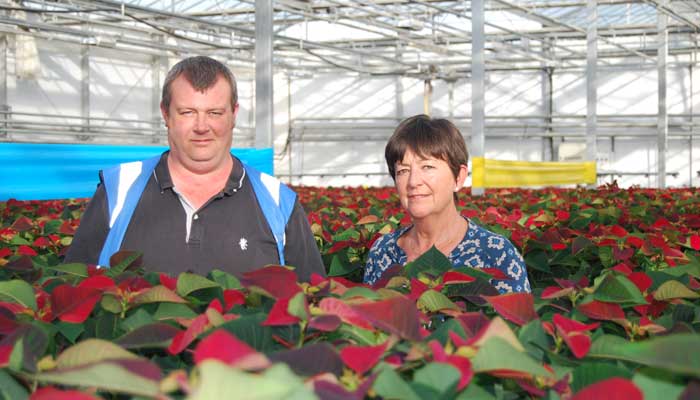
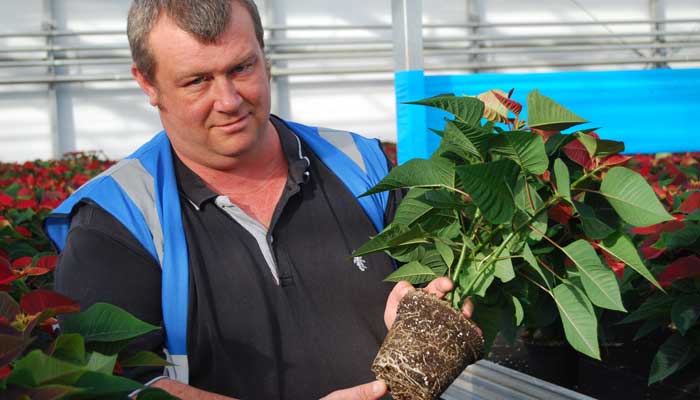
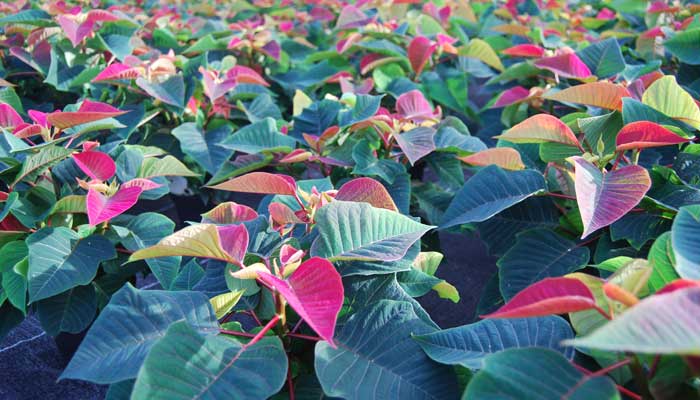

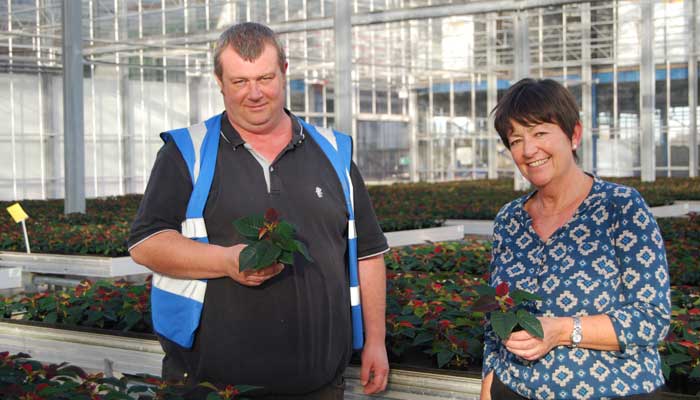
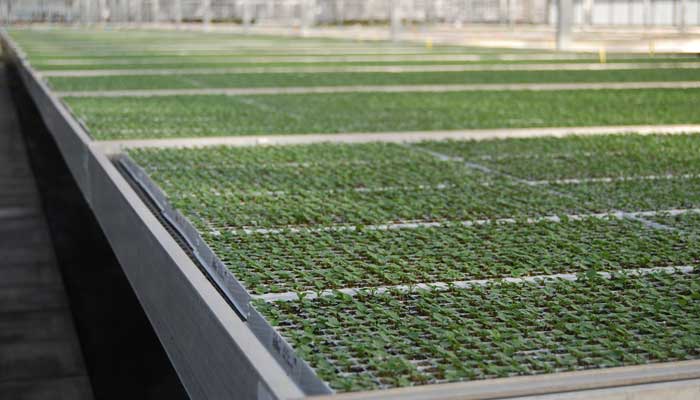
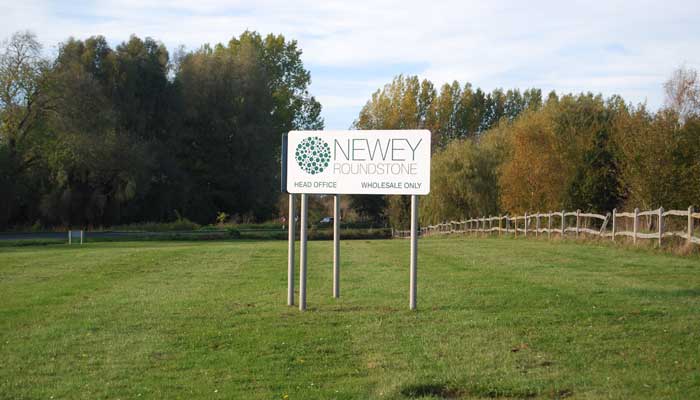
In 2018 these south coast sites, which enjoy optimal UK natural light levels, produced 190million young plants plus 82million retail-ready plants. The last two weeks of July sees the start of the Poinsettia crop with 300,000, an increase of 20,000 on last year, destined for the UK market. Alongside the standard 10.5cm and 1litre ranges, the skilled production teams produce Poinsettia minis in 6cm pots.
According to Mark Wallis, growing manager at the Newlands site, Poinsettia can be a challenging crop not least due to tight supermarket specifications, exacting humidity requirements and a zero whitefly tolerance - due to the constant Bemisia threat. Poinsettias are a exacting crop and Mark manipulates the EC of the water to control growth. “Basically, we aim for a higher EC at the beginning of the crop and a lower one toward the end - so bracts don’t grow too large,” he explains.
“No two years are the same. The 2018 season has had its challenges due to supply problems forcing us to make last minute changes to the varieties we’re growing. All varieties behave slightly differently so we’ve having to tailor the crop management accordingly.
“In 2017 the warm wet weather caused high humidity issues. However, perhaps the greatest challenge was in 2015 when we had a chlorosis issue with yellowing leaves. At this time we relied on a standard growing feed, switching to a high Potassium feed when the crop started colouring up.”
ICL’s technical manager Andrew Wilson and technical area sales manager Jackie Hall visited the sites and employed ICL’s AngelaWeb precision nutrition software programme to plot the nutritional requirements of a Poinsettia crop throughout its lifetime. “The graph showed our current nutrition programme was not delivering sufficient Nitrogen throughout the crop,” says Mark.
“In 2016 we took it a step further with Jackie taking water samples – these showing different water qualities at the two sites. At Newlands we have a lined reservoir supplemented with borehole water and overall it is soft, however, not as soft as at Batchmere − which relies solely on reservoir water for its irrigation need.”
Inputting the water sample data to AngelaWeb, Jackie showed the management team the irrigation water was contributing to the problem. “From the graph it was clear the Nitrogen and Calcium levels in our current feeding programme were insufficient to fulfill the needs of the crop,” says Mark.
Using AngelaWeb to look at the nutrient profile of a range of ICL products, Jackie recommended a new programme using high purity Peters Excel CalMag Grower (15-5-15+CaO+3MgO+TE) – which helps combat soft-water conditions − supplemented with Calcium Nitrate.
“We already had experience of using Peters Excel to great effect in our propagation unit,” says Mark. “This gave us the confidence to switch – we’ve not looked back.”
Taking in to account the detailed water analysis results at each site, AngelaWeb calculated exactly how much Peters Excel CalMag Grower and Calcium Nitrate the production teams need to add to the 1000l stock tank at Newlands and Batchmere sites to get the correct balance of nutrients.
“The high purity of the Peters Excel means it can be run at a higher EC,” explains Mark. “Cheaper fertilizers can be false economy as they contain impurities that don’t dissolve. Containing a higher percentage of non-valuable material, these products tend to push up the EC. In contrast, with Peters Excel you are not paying for nutrient you are not using.
“Peter Excel CalMag Grower has made crop management easier,” says Mark. “It might cost more per kilo than cheaper formulations but we can use it at a lower rate, which also helps to lower EC. It offers additional savings - the pure formulation means it is completely soluble. While helping to keep irrigation pipes clear, we don’t get any sludge build up the bottom of the feed tanks.
“The unique M-77 chelating formula helps generate a quick plant response while the Calcium helps keep the plants healthy.
“We are seeing improvements in quality and crop colour throughout production. We don’t want to loose lower leaves as this adds to crop losses. Switching to Peters Excel CalMag has almost eliminated yellow leaves, which makes packing more efficient - as less time is spent cleaning plants - helping to reduce labour. “Overall, historically we’ve worked on 10% wastage rates but having refined our nutrition programme we are significantly reducing this,” he says.
Horses for courses
Newey Roundstone is one of just a few large UK nurseries to produce seedling raised bedding, with over 1,000 lines grown to order in 264 and 480 plug trays. The operation produces all its own plugs supplying Newey Young Plants.
“The propagation unit relies 100% on the Peters Excel range,” says Mark. “We start feeding from the minute the crops are sown. The first three weeks we rely on Peters Excel CalMag Grower to keep the EC low, before switching to Peters Excel CalMag Finisher (13-5-20+7CaO+2MgO+TE) for the last three weeks.
“We made the switch to the Peters Excel soft water range in 2010 having seen the quality achieved by Dutch plug producers, who were already using the range and achieving superior results.
“The Peters is so pure you get healthier plant with less stretching – which means we’ve been able to significantly reduce our use of growth regulator. Delivering the right balance of nutrients gives you better control over crops.”
Back in 2017, the Newey Roundstone production team suddenly experienced issues with residue on the pack bedding leaves. “ICL came in and quickly got to the bottom of the problem,” says Mark. “Our reservoir had run low and we had switched almost solely to borehole water - which was causing the issue. To counter this we were advised to temporarily switched to Universal Hard Water 225. After more rainfall, Jackie had the water re-analysed and we switched back to Universol Soft Water 213R. We now keep an eye on the reservoir so it doesn’t get too low.”
Summing up Mark says; “It’s really a case of horses for courses. We rely on Peters Excel for our higher value propagation and Poinsettia crops, while we put our trust in Universol – ICL’s standard range – for economical production of pot and pack bedding crops.”
